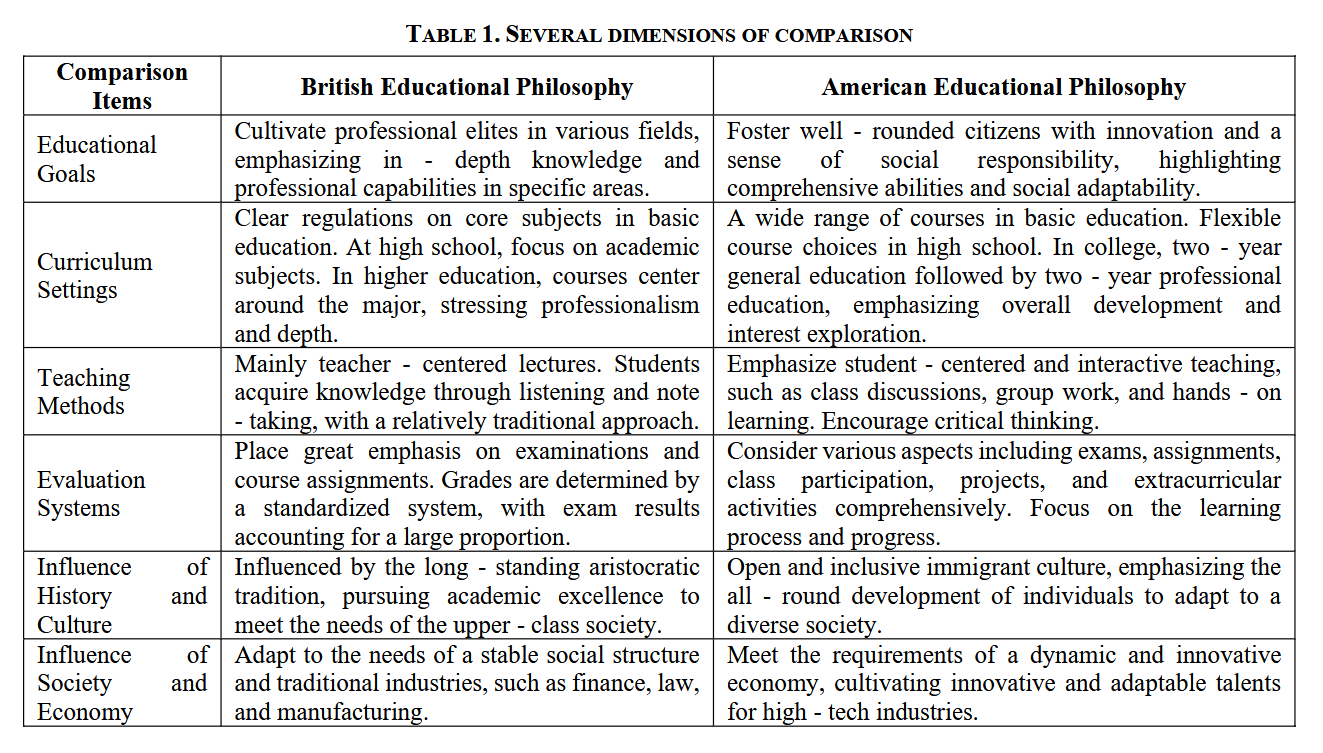A Comparative Study of British and American Educational Philosophie
DOI:
https://doi.org/10.70393/6a6574.323630ARK:
https://n2t.net/ark:/40704/JET.v1sp2a03Disciplines:
Educational PhilosophySubjects:
Educational AimsReferences:
14Keywords:
British and American Educational Philosophies, Comparative Study, Educational ReformAbstract
This paper conducts an in - depth comparative study of British and American educational philosophies. By analyzing and contrasting the two countries in aspects such as educational goals, curriculum settings, teaching methods, and evaluation systems, it reveals the underlying cultural, historical, and social factors. The findings aim to provide valuable references and inspiration for the educational reform and development in other countries.
References
[1] Breinig, H. , Gebhardt, Jürgen, & Ostendorf, B. . (2001). German and American higher education : educational philosophies and political systems. Lit.2.
[2] Tapingkae, A. . (1967). Eternity and enlightenment: a comparative study of the educational philosophies of american idealism and theravada buddhism.
[3] Bredo, E. . (2006). Philosophies of educational research.
[4] EdwardJ. Philosophy of education:studies in philosophies, schooling, and educational policies. Prentice-Hall, Inc.
[5] Fritz, A. . (2008). Educational philosophies and teaching styles of Oklahoma elementary public school teachers of English language learners.. (Doctoral dissertation, Oklahoma State University.).
[6] Conti, G. J. . (2007). Identifying your educational philosophy: development of the philosophies held by instructors of lifelong-learners (phil). Journal of Adult Education, 36.
[7] Kunjumuhammed, S. K. , Tabash, B. K. H. , Pandurugan, V. , & Almahamid, S. M. . (2023). "Hugging the middle" on selection of educational philosophy: empirical evidence from higher education in Sultanate of Oman.
[8] Kr, P. , & Aptoula, N. Y. . (2024). Unlocking the influence of training on language instructors' written corrective feedback literacy. Erzincan University Journal of Education Faculty / Erzincan Üniversitesi Egitim Fakültesi Dergisi, 26(2).
[9] Schultz, A. . (2024). Nature in frames: the miseducation of the idle stare. Journal of Aesthetic Education, 58(3).
[10] Kay, L. . (2024). 'i feel like the wicked witch': identifying tensions between school readiness policy and teacher beliefs, knowledge and practice in early childhood education. British Educational Research Journal, 50(2).
[11] Mason, K. , Anderson, L. , Black, K. , & Roberts, A. . (2024). A shout‐out for the value of management education research: 'pedagogy is not a dirty word'. British Journal of Management, 35(2).
[12] Dawson, K. , Wallace, H. , & Bayes, S. . (2023). "i believe…" - graduating midwifery students' midwifery philosophies and intentions for their graduate year: a longitudinal descriptive study. Midwifery, 125.
[13] Ghosh, S. S. , & Roychowdhury, D. . (2024). Dialogue and dissonance : the role of language in shaping educational philosophies and social structures.
[14] Thomas Uzomba, A. S. . (2024). Recovering a Foundational Spirit: The Educational Thought of Dr. Anna Julia Haywood Cooper. Palgrave Macmillan, Cham.

Downloads
Published
How to Cite
Issue
Section
ARK
License
Copyright (c) 2024 The author retains copyright and grants the journal the right of first publication.

This work is licensed under a Creative Commons Attribution 4.0 International License.
















